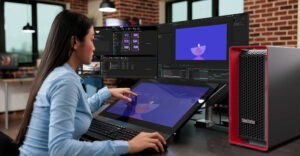
Oracle launched new midrange and high-end Sparc T5 and M5 servers this week with claims that the T5 models have set 17 world records and performed better than IBM’s Power 780 series.
That set off a round of dueling statements between the companies.
“Most Oracle benchmark claims are not audited or published, although they do have some industry benchmarks, including TPC-C (Transaction Processing Performance Council),”IBM spokesperson Jeff Cross told TechNewsWorld. “I believe some of the systems they cited aren’t shipping until September.”
Oracle did not respond to our request to comment for this story.
The most recent test results by the Transaction Processing Performance Council, which measures the speed of server database and e-commerce transactions, showed Oracle taking first place with its T3-4 servers. The IBM Power 780 Model 9179-MHB coming in second. Oracle’s T5-8 server, which is scheduled to ship in September, came in third.
“The view Oracle presents of its solutions focuses almost entirely on the benefits they provide related to other Oracle products,” said Charles King, principal at Pund-IT. “General purpose systems are often purchased to support other vendors’ solutions [but] there was little if any mention of other vendors supporting the new T5 servers.”
Oracle Speed Claims
Oracle’s T5 servers run on what the company claims is the world’s fastest microprocessor, the Sparc T5, which operates at 3.5 GHz.
The T5-8 is the fastest single server for Oracle Database, and for Oracle Middleware, according to the company. For the latter, the T5-8 is purported to offer a 12x cost-performance advantage over the IBM Power 780. It has a 2.5x price-performance advantage over the IBM P780 3-node cluster, inclusive of hardware and software costs.
The Sparc T5-8 has a 7x price advantage over a similar IB Power 780 configuration for database on a server-to-server basis, Oracle said.
However, “Oracle is not the fastest as it claims,” said Joe Clabby, president of Clabby Analytics. IBM’s System z12 is the fastest microprocessor in the industry, operating at 5.5 GHz; and IBM’s Power 7+ processor operates at 4.4 GHz.
Benchmarks aren’t a true indicator of a processor’s capabilities because “some benchmark configurations use components and approaches that would never be used in the real world,” Clabby told TechNewsWorld. “Most don’t take quality of service into consideration, and most favor distributed systems with shared-nothing architectures” that can be “tuned to the extreme to perform a particular workload with very little sharing overhead.”
The Oracle T5 Server’s Specs
Oracle’s statement focused on its T5 mid-range servers, which the company claims are the world’s best platforms for enterprise computing at any scale.
The T5-8 comes in 2 TB and 4 TB versions. It has a 16-core 3.6 GHz Sparc T5 processor with up to 128 threads per processor for a maximum 1,024 threads per system. It has 16 floating-point units, and each Sparc T5 processor has 16 cryptography units.
Each processor has 8 MB shared cache; 8 banked, Level 3 cache; and 182 KB of Level 2 unified cache per core.
Why IBM is Mad
The supremacy Oracle claims in results submitted to TPC “are often in comparison to IBM systems that are 3-5 years old,” Cross said.
IBM contends that Oracle’s pricing doesn’t include software and storage while its own does, but “determining how much those components add to the overall price is nigh unto impossible” because the pricing of enterprise hardware and software depends on various factors, King told TechNewsWorld. Those factors can include contract length, what hardware and software services are included, and whether services are lumped in.
Sparc “has been a losing proposition for Oracle for some time,” Cross said. “Last year, we had over 350 competitive takeouts worth over $335 million, half of which were from Oracle and half from HP.”






















































Just an observation: when children start loosing an argument they sometimes result to name calling. So, because two independent analysts disagree with your position, you attack their credibility by claiming they are on IBM’s payroll? Who’s payroll are you on?
As for me, I have many technology clients. IBM, RedHat, QLogic, Correlsense, OpTier, ExtraHop, CA Technologies, and more — and Microsoft and Oracle have been clients of mine in the past. I also do a fair AM ount of consulting/training in the Middle East. I AM an independent businessman — and I’m on my own payroll. You, however, collect a paycheck from Oracle every week…
Instead of name calling, let’s get to the real point. You have an opinion, I have a counter opinion. I like this situation because it gives readers an opportunity to look at both opinions and decide who is right. It is a very healthy exchange of ideas.
Perhaps in the future you could show some maturity and leave the name calling out of your argument. It really isn’t very dignified.